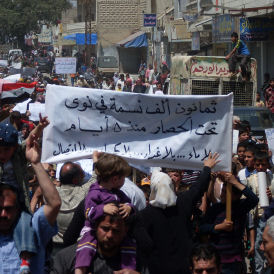Syrian troops open fire as thousands mark ‘day of rage’
Eyewitnesses say Syrian soldiers are firing in the air in Deraa as mass protests take place across the country. A crowd of 10,000 marchers was dispersed with tear gas in the capital Damascus.

Residents of the southern city of Deraa say Syrian soldiers fired shots in the air to stop people attending Friday prayers or protesting against the rule of President Bashar al-Assad.
There have been reports of a hospital near Deraa receiving 24 bodies of villagers – inclusing two children – killed by security forces at the entrance to the city.
“They will open fire (on you) if you leave your house,” one eyewitness said. Another resident spoke of a “siege around the city” but said busloads of people from villages around Deraa were planning to flock to the city to take part in a “day of rage”.
Abu Mohammad told Al Jazeera television: “The snipers are on rooftops of buildings firing at anything that moves. They are preventing people from going to the streets.”
Witnesses said roads into the capital Damascus were closed on Friday morning, to prevent people marching from the rural areas around the capital into the city.
However, about 10,000 people marched in support of Deraa from the old Midan district of Damascus. The march was dispersed by security forces firing tear gas at protesters.
Rights campaigners say it was the biggest protest in the capital since the mass democracy movement began six weeks ago.
There were also demonstrations in the central cities of Homs and Hama, Banias on the Mediterranean coast, Qamishly in eastern Syria and Harashta, a Damascus suburb.
Expectations of violence after Friday prayers – the only time Syrians are allowed to gather en masse – is running high after the Muslim Brotherhood joined calls for protests against Assad for the first time.
The organisation, which is banned in Syria, said Syrians should take to the streets to demand freedom ahead of Friday prayers. In a statement, it said: “Do not let the regime besiege your compatriots. Chant with one voice for freedom and dignity. Do not allow the tyrant to enslave you. God is great.”
Syrian Republican Guard trucks equipped with machine guns and carrying soldiers in combat gear patrolled the circular road around Damascus ahead of prayers.
Other witnesses said various security units and secret police manned checkpoints around Damascus, cutting off the city from the suburbs and rural regions, as telecommunications and electricity were cut off from urban centres and towns that had defied warnings not to be the scene of anti-government protests.
Republican Guards deployed in the suburb of Douma earlier this week and Assad sent the Fourth Mechanised Division under the command of his feared brother Maher to Deraa, the cradle of the democratic uprising against his 11-year autocratic rule.
Opposition leader Habib Ibrahim said thousands of people in Kurdish regions of eastern Syria were also demonstrating in solidarity with the protesters there.
Protesters in Syria, inspired by uprisings across the Middle East, have been subject to brutal crackdowns over the last few weeks by Syrian security forces. Tanks have been sent in by the government to crush protests where they first erupted, in Deraa, and many civilians have died after security forces opened fire on their own people.
Human rights group Sawasiah said the death toll in the last six weeks had risen to at least 500.
On Thursday, 200 members of Assad’s Baath Party resigned over the treatment of protesters – an act which would have been unthinkable before the recent pro-democracy protests. But the Baath Party said it had more than a million members, making the resignations only symbolic.
European governments will discuss Syria in meetings on Friday, and the US said it is considering tightening sanctions. Australia’s Foreign Minister Kevin Rudd has also called for tougher international sanctions, and for the United Nations to investigate the killings.
On Friday, the UN deputy high commissioner for human rights, Kyung-Wha Kang, issued a warning to the Syrian government, saying: “Syria has a responsibility to protect its population from crimes against humanity and other international crimes.
“In this context I should like to underscore that any official ordering or undertaking of attacks against the civilian population can be held criminally accountable. Such attacks that occur on a systematic or widespread basis may amount to crimes against humanity.”




